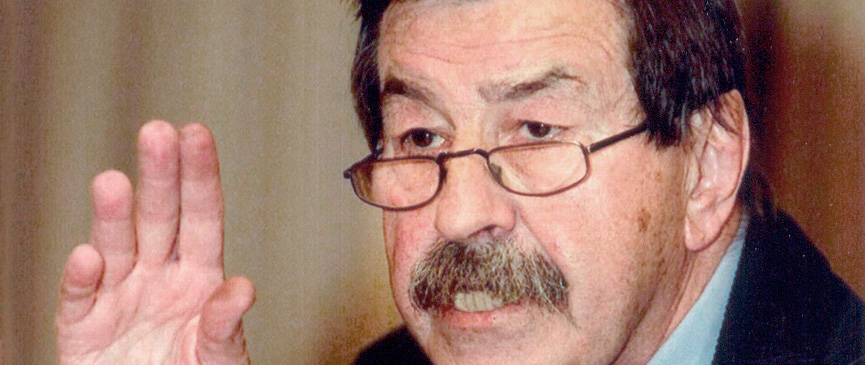You are in:
Laureates
Start of main content
Günter Grass
Prince of Asturias Award for Literature 1999

Günter Grass (Danzig [Gdansk], 1927 - Lübeck, Germany, 2015), Nobel Prize for Literature (1999),at the age of 17 he was called up to serve in the war as an Air Force auxiliary crewmember. He was wounded, made prisoner, and then freed in 1946.
He worked as a stonemason´s apprentice, and studied painting and sculpture in Düsseldorf and Berlin. During the fifties, he travelled around Italy, France and Spain, and began a promising career as a poet. His first book, which verges on Surrealism, was "The Merits of Windfowl" (1956). This same year Grass set up residence in Paris, where he wrote several plays and the novel which was to make him world-famous, "The Tin Drum" (1959). In ways reminiscent of the Spanish Picaresque novel, the protagonist, Oskar Matzerath, the child who refuses to grow up in protest at the atrocities of German history, has become an established figure of world literature. Grass, a member of the 47 Group that played such a fundamental role in post-war German literature, has since received many awards, the Büchner Prize (1965).
Back in Berlin in the sixties, Grass wrote another two novels, "Cat and Mouse" (1961) and "Dog Years" (1963). Alongside his earlier novel they form what is known as "The Danzig Trilogy." In 1966 he also wrote his most important play, "The Plebeians Rehearse the Uprising". Grass was very active in politics, campaigning during these years for the Social Democrat Party, and documenting his experiences in "From the Diary of a Snail" (1972).
Günter Grass travelled through Asia and North America in the seventies, working on engraving and lithography and writing numerous essays on a wide range of topics before then writing another major novel, "The Flounder"(1977), spanning thousands of years, taking place over nine eras, and combining children´s stories, mythology and history. In the 80s Grass sculpted and drew prolifically. His main literary work is "The Rat", an apocalyptic novel in which rats inherit the earth. In 1986, Grass travelled to India, returning some months later with many ideas, a notebook full of drawings and a new book, "Show your Tongue" (1988).
"The Call of the Toad" (1992) is, relatively speaking, a lesser work - a simple love story between two elderly people set against the most modern of backdrops. However, Grass´ great novel of the nineties is undoubtedly "So far afield" (1995), where he deals with the difficult question of German reunification, drawing a parallel between a character from fiction, Theo Wuttke, and the nineteenth century writer, Theodor Fontane, author of the immortal "Effi Biest".
Grass´ latest book to date is "My century" (1999). In a tremendous display of artistic ability, he dedicates a short story (and a watercolour) to each of the years of the century which is about to draw to an end.
A list of the honours bestowed on Günter Grass during his lifetime would be seemingly endless. However one that he himself confesses to prizing most is the "Hidalgo", awarded by the Asociación Presencia Gitana (The Association for the Presence of Gypsies). This is because his unremitting defence of human rights and unfailing moral commitment to the era he happens to live in are as important as Grass´ literary and artistic work, or perhaps even more so. Günter Grass´ candidature for the Prince of Asturias Award for Letters was put forward by the Yehudi Menuhin International Foundation.
Günter Grass died on 13 April, 2015.
End of main content
Sección de utilidades
Fin de la sección de utilidades
- Legal document Legal document (Access key 8)
- | Privacy policy Privacy policy (Access key )
- | Social networks ???en.portal.pie.menu107.title???
- | Cookies ???en.portal.pie.menu110.title???
- | Site map Site Map (Access key 3)
- | Contact Contact (Access key )
- | XHTML 1.0
- | CSS 2.1
- | WAI 'AA
© Copyright 2024. FUNDACIÓN PRINCESA DE ASTURIAS
 Speech by the laureate
Speech by the laureate



